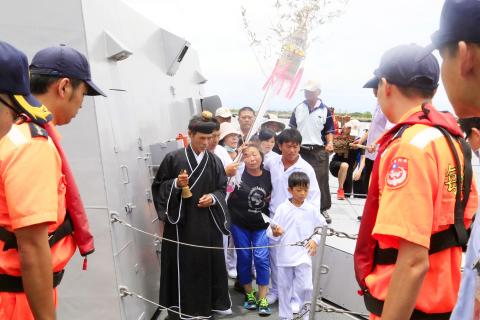The Ministry of National Defense on Saturday issued a detailed news release to debunk a string of conspiracy theories surrounding the launch of a missile on Friday last week, that resulted in the death of a Taiwanese fisherman and three injuries.
The release started by asking how a noncommissioned officer could be allowed to “do it alone” without receiving the consent of his superiors.
The ministry said the warship’s commander, senior arms officer and missile launch control sergeant had all failed to follow standard operating procedure before the sailor chose the wrong operation mode, committing a series of disciplinable mistakes that resulted in the historic fiasco.

Photo: CNA
The ministry said it had learned a tough lesson from the mishap, adding that from next week, it would enforce stricter training programs for all military units, particularly in the area of standard operating procedures, to prevent a similar incident from occurring.
Regarding whether it was appropriate for the armed forces to conduct a live-fire training exercise while President Tsai Ing-wen (蔡英文) was on a foreign visit, the ministry said the corvette was not participating in a “military drill,” but rather a “test of training results.”
As to why sailors on the vessel did not initiate the Hsiung Feng III missile’s “self-destruct” system, the ministry said the mechanism is only installed in missiles during formal military exercises and, as the crew was not participating in such an exercise, that option was unavailable.
In response to rumors that Petty Officer, Second Class Kao Chia-chun (高嘉駿) “exulted” after launching the missile, the statement said: “No, our investigation found that to be untrue.”
Another rumor was that Kao showed no remorse over his actions and posted some remarks on Facebook and played games after the incident.
The ministry said Kao’s mobile phone was immediately confiscated and examined, and no evidence was found to support such speculation.
“The rumor is false,” it added.
Regarding why the navy did not send any ships or aircraft to the scene after the incident, with only Coast Guard Administration vessels seen on site, the ministry said the navy dispatched two corvettes, four speedboats and two helicopters to search for the missile and immediately contacted the coast guard for assistance in recovery efforts.
The ministry also rejected reports that an ammunition ship was preparing to enter the harbor when the missile was mistakenly launched.
The missile was designed to attack military vessels, and as the structure of fishing boats tends to be lighter and weaker, the impact lacked the strength to detonate the warhead, the ministry said in response to why the missile did not explode.
In response to an allegation by Lu Li-shih (呂禮詩) — the former commander of a Chinchiang-class corvette, the same type of warship involved in the incident — that the launch occurred because control procedures for the missile’s launch key were not properly followed, the ministry said the Hsiung Feng III does not have a launch key, and therefore no control procedures were needed.
The ministry said it deeply regretted Lu’s “mistaken” and “misleading” comments about the case.

Alain Robert, known as the "French Spider-Man," praised Alex Honnold as exceptionally well-prepared after the US climber completed a free solo ascent of Taipei 101 yesterday. Robert said Honnold's ascent of the 508m-tall skyscraper in just more than one-and-a-half hours without using safety ropes or equipment was a remarkable achievement. "This is my life," he said in an interview conducted in French, adding that he liked the feeling of being "on the edge of danger." The 63-year-old Frenchman climbed Taipei 101 using ropes in December 2004, taking about four hours to reach the top. On a one-to-10 scale of difficulty, Robert said Taipei 101

A preclearance service to facilitate entry for people traveling to select airports in Japan would be available from Thursday next week to Feb. 25 at Taiwan Taoyuan International Airport, Taoyuan International Airport Corp (TIAC) said on Tuesday. The service was first made available to Taiwanese travelers throughout the winter vacation of 2024 and during the Lunar New Year holiday. In addition to flights to the Japanese cities of Hakodate, Asahikawa, Akita, Sendai, Niigata, Okayama, Takamatsu, Kumamoto and Kagoshima, the service would be available to travelers to Kobe and Oita. The service can be accessed by passengers of 15 flight routes operated by

Taiwanese and US defense groups are collaborating to introduce deployable, semi-autonomous manufacturing systems for drones and components in a boost to the nation’s supply chain resilience. Taiwan’s G-Tech Optroelectronics Corp subsidiary GTOC and the US’ Aerkomm Inc on Friday announced an agreement with fellow US-based Firestorm Lab to adopt the latter’s xCell, a technology featuring 3D printers fitted in 6.1m container units. The systems enable aerial platforms and parts to be produced in high volumes from dispersed nodes capable of rapid redeployment, to minimize the risk of enemy strikes and to meet field requirements, they said. Firestorm chief technology officer Ian Muceus said

MORE FALL: An investigation into one of Xi’s key cronies, part of a broader ‘anti-corruption’ drive, indicates that he might have a deep distrust in the military, an expert said China’s latest military purge underscores systemic risks in its shift from collective leadership to sole rule under Chinese President Xi Jinping (習近平), and could disrupt its chain of command and military capabilities, a national security official said yesterday. If decisionmaking within the Chinese Communist Party has become “irrational” under one-man rule, the Taiwan Strait and the regional situation must be approached with extreme caution, given unforeseen risks, they added. The anonymous official made the remarks as China’s Central Military Commission Vice Chairman Zhang Youxia (張又俠) and Joint Staff Department Chief of Staff Liu Zhenli (劉振立) were reportedly being investigated for suspected “serious